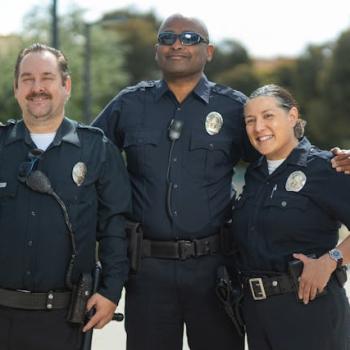Lectionary Reflections
Matthew 28:1-10
April 20, 2014
The angels in Matthew's gospel remind me of my UPS man. He's very focused on his job. He is there to deliver a package, not to sell it to me. "Hey Mrs. M., I understand your husband has seasonal allergies. Here is a humidifier from the Sharper Image. It got an excellent Consumer Report rating. There is a rebate coupon enclosed. I highly recommend it."
He's there to deliver a package, not there to be my buddy or to empathize with me. "Hey Mrs. M., how are you feeling about this humidifier? I know anxiety can be part of the process of receiving a package so I just want to reassure you that it will be a positive addition to your home and to encourage you in the big step of accepting it into your home."
No, my UPS man is there to ring the doorbell, hand me the package, and hold out the clipboard for me to sign for it.
The angels in Matthew's gospel are like my UPS man. They are focused on their job—to deliver the Good News. They are not there to sell it to us. They are not there to be our buddy or to empathize with us. They're there to deliver their package, and it's up to us to sign for it, open it, and use it.
The Good News is only ever preceded by one short, preliminary sentence: "Don't be afraid."
"Don't be afraid, Zechariah, your wife Elizabeth will bear a son and you will name him John."
"Don't be afraid, Mary."
"Don't be afraid, shepherds. I bring you good news of great joy that shall be to all people."
"Don't be afraid, Joseph, take Mary as your wife. Her baby is conceived by the Holy Spirit. Name him Jesus; he's going to save all people from their sins."
"Don't be afraid," the angels say. And then they deliver the package, you sign for it, open it, and use it.
I especially love the angel in Matthew's version of the Resurrection. This is an angel who knows how to make an entrance. He comes in with a flourish! This is a buff angel. He rolls back the large, sealed stone. This is an angel with attitude. After he rolls back the stone, he sits on it, and crosses his angelic arms. He glances over at the guards who are displaying certain physical symptoms of extreme terror we won't go into. He doesn't tell them not to be afraid, I assume, because he doesn't care if they are afraid or not. That message is being reserving for someone else, or two someone elses.
This angel rolls his eyes, as if to say: "Take that, Caiaphas. Take that, Pilate. That's what God thinks of your effort to put the Messiah in a tomb! A tomb as a prison for the Prince of Peace, the Son of God? Think again! A tomb for his final resting place? I don't think so."
Then, for his main message, he turns his bright angelic eyes toward Mary Magdalene and the other Mary (whom in Matthew is probably the mother of Jesus) and says: "Do not be afraid. I know that you are looking for Jesus who was crucified. He is not here. He has been raised, as he said."
Matthew wants to make sure we notice these three little words "as he said." Because in Matthew's gospel, Jesus told you so—three times. Jesus tried to deliver the good news package to the disciples in his gospel three times, but they refused to sign for it.
Why do we—like them—despite the witness of Scripture, tradition, and our life of worship and service, still come to so many situations looking for death when we have been promised life is waiting there for us?
Is it because when we look to the past we see that life has dashed our high hopes? Things didn't turn out like we hoped? Circumstances went against us? Other people disappointed or hurt us?
- "You're breaking up with me now? And through a text?"
- "I thought I was in line for that position."
- "I've watched my diet and exercised three times a week. What do you mean I have cancer?"
- "There were no signs that she was depressed. She baked a cake this morning."
- "Shouldn't there be a heartbeat at twelve weeks?"
Why is it that we only hear the first half of Jesus' prediction: "The Son of Man will suffer and be killed..." but forget what comes next? Why do we come to so many situations alert to signs of death, disappointment, and defeat, when we have been promised life and hope and victory is waiting there?
Is it because, when we look to the future, with what we know of life, we know that difficult situations lie ahead?
I was invited to the "Two by Two" Sunday School class at a large church in Dallas some time ago. They wanted me to teach a session on the parables. I deduced that this was a couple's class of mature adults. As instructed, I arrived at 9:20, came in the side entrance, went up the stairs and turned right. A lady named Alice greeted me and called over another lady whose name was also Alice and we compared notes about being Alices for a while. Looking around I noticed there were a lot more women than men. There was another lady standing to the side with a sort of pensive look on her face. I greeted her and she brightened up a bit. "When was this class founded?" I asked. "My husband and I joined the class in 1955. He died last year. The group has been together for years. But now all of us are old and a lot of us are dead." Then, realizing how that sounded, she smiled brightly and added, "And we're so glad to have you join us this morning!"





